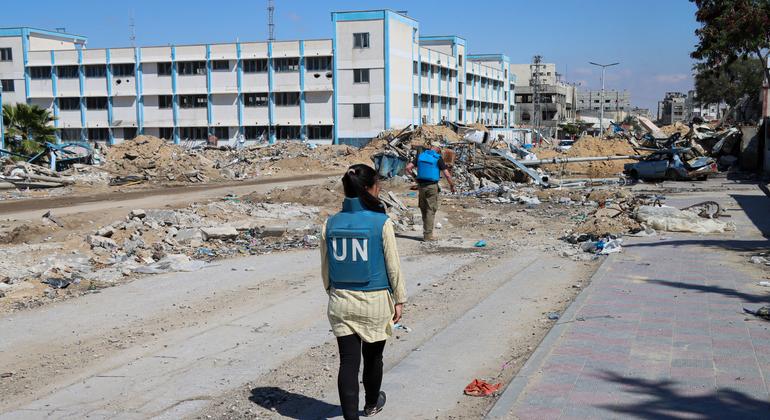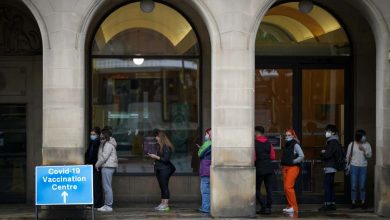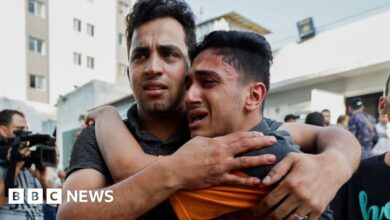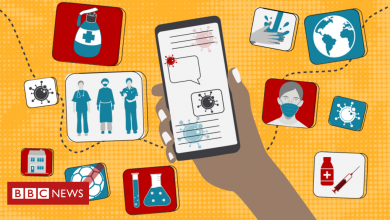Gaza: No improvement in aid access in the north, senior UN aid official insists

Jamie McGoldrick, the United Nations Humanitarian Coordinator overseeing crisis relief operations in Gaza, rejected Israel’s claim that more than 1,000 trucks have entered Gaza in the past few days, but only about 800 have been collected on the Palestinian side.
The veteran aid official also asserted that the deconfliction system in which humanitarians share their coordinates with warring parties is “always inaccurate,” but he raised these issues and other operational concerns with the Israeli military during their first meeting earlier this week.
“It would be easy for Israel to say we sent you 1,000 trucks, so deliver them inside Gaza,” he said, in a new call to Israeli authorities to acknowledge that Their responsibility as the Occupying Power “ends only when… aid reaches you”. civilians in Gaza”.
Security gap
Describing long delays at checkpoints and “security gaps” inside the region that continue to hinder the delivery of aid where it is needed most, the United Nations official noted that the Children’s Fund United Nations (UNICEF), whose car was hit by live bullets on Thursday, was held “for hours” at a checkpoint on Salah Al Deen Road.
As of this month, about 60 hours have been wasted in this way, Mr. McGoldrick emphasized. “And then what happens sometimes, it’s too late in the day – because you can only travel during the day – to go north and so sometimes the mission is aborted. And then we were blamed by Israel for canceling the convoy and canceling the mission to the north.”
There are currently only three roads open for humanitarian relief in Gaza: the middle route via Salah Al Deen road, the coastal Al Rashid road and the military road in eastern Gaza. “At no point in the past month and beyond have we had three or even two of those roads operating at the same time,” The UN aid coordinator affirmed, adding that all the highways were in “very poor condition”.
The consequences of “very limited” aid missions in the north of the region were clear, Mr. McGoldrick continued, based on how low birth weight the babies were.

United Nations Humanitarian Coordinator Jamie McGoldrick (center) visits Kamal Adwan Hospital, the only children’s hospital in northern Gaza.
Hunger threatens life
Speaking from Jerusalem, he described visiting Kamal Adwan Hospital two weeks ago, where “every patient” in the children’s ward faced life-threatening hunger.
“The last baby I saw lying in the incubator was a two-day-old baby boy who was not premature – he was born nine months later – but weighed 1.2 kg. There will be long-term consequences that will be reflected in that child’s developmental abilities.”
Emphasizing the need for a direct phone line to the Israeli military “and the ability to talk to them,” Mr. McGoldrick noted that targeting the convoy of the NGO World Central Kitchen two weeks ago The former is only recent evidence of the constant dangers faced by aid teams operating in Gaza.
“We have to have handheld radios, VHF radios, all the things you would have in any normal problem, in a normal crisis. We don’t have them,” he said, asserting that Israeli authorities do not allow them out of fear that they could be used by Hamas militants.
Evacuation call
Reiterating concerns about the dire health care situation in Gaza, the United Nations World Health Organization (WHO) calls for a structured medical evacuation system to treat patients, instead of the current “ad hoc” arrangement.
Damage to Al Shifa Hospital – the largest hospital in Gaza – during Israel’s two-week military raid left a “Giant crater” at the specialized surgery areasaid Thanos Gargavanis, WHO trauma surgeon and paramedic.
Speaking from Gaza, Dr Gargavanis said the hospital was completely destroyed, including oxygen machines, laboratory equipment and other vital equipment including CT scanners and other machinery needed for care. Squirrels save lives.
“The buildings themselves were burned down, the walls were lost; “There were bullet holes and fire all along,” the WHO official noted before describing how a hospital worker last week found empty spaces filled with makeshift graves or with bodies lying uncovered. Cover or cover with a plastic sheet.
WHO and other UN agencies have ensured that the deceased found at Al Shifa can be given a dignified burial, after naming the bodies or making them identifiable by testing. DNA testing in the future.
“After this destruction, we feel that we are going back 60 years before medical imaging, where there were no laboratory tests,” Dr. Gargavanis said. “We want to emphasize again that hospitals should never be militarized.”




